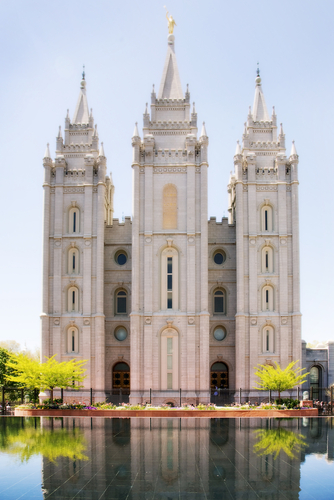
 Yesterday, Dieter F. Uchtdorf, a member of the LDS First Presidency, told Mormons that “learning about the real struggles and real successes of early Church leaders and members is a very faith-promoting process” for him.
Yesterday, Dieter F. Uchtdorf, a member of the LDS First Presidency, told Mormons that “learning about the real struggles and real successes of early Church leaders and members is a very faith-promoting process” for him.
As the Salt Lake Tribune reported, Uchtdorf said that Mormons should navigate a middle road: we shouldn’t shy away from our history out of fear of what we might find, but we also shouldn’t automatically assume that any inconsistencies or human foibles we discover cancel out the truths of the gospel’s message:
We always need to remember that transparency and openness keep us clear of the negative side effects of secrecy or the cliché of faith-promoting rumors. Jesus taught the Jews, “Then you will know the truth, and the truth will set you free.” Truth and transparency complement each other.
In my opinion the talk was a welcome departure from some of the Church’s past hard-line rhetoric that all history needed to be faith-promoting. In a 1981 CES talk, Boyd K. Packer said,
There is a temptation for the writer or the teacher of Church history to want to tell everything, whether it is worthy or faith promoting or not. Some things that are true are not very useful.
President Packer advocated withholding such historical facts from new converts and those weaker in the faith. “[W]e must give milk
before meat,” he told the educators. “The Lord made it very clear that some things are to be taught selectively and some things are to be given only to those who are worthy.”
Scholars and writers, he clarified, may imagine they are just being objective in presenting unflattering facts about Church history, when in fact they are “giving equal time to the adversary” and fail to realize what is at stake. “There is a war going on, and we are engaged in it. It is the war between good and evil, and we are belligerents defending the good.”
President Uchtdorf’s talk yesterday went a long way toward softening, if not erasing, that decades-old fear of professional history. Yesterday’s speech emphasized that Mormons have nothing to be afraid of in our past — much better to have everything out in the open, which is what the Church has been quietly doing these past few months with its “Gospel Topics” series about controversial topics like polygamy, race and the priesthood, and DNA and the Book of Mormon.
Yesterday’s words also opened the door for some humility on both sides. The plea for humility is not new; President Packer’s talk from 1981 was full of statements about the arrogance of thinking there is only one way of looking at a question. Only in his case, the arrogance was always on the side of professional historians and scholars who were too prideful to admit that the fulness of truth already resided in the Church of Jesus Christ of Latter-day Saints. He saw arrogance in “worldly” scholarship.
President Uchtdorf’s talk instead gently cautioned listeners against any arrogance that might automatically close us off to other perspectives. I took his words to mean that Mormons can still believe in the timeless truth of the gospel while recognizing that we are historically and culturally conditioned creatures. He said:
Isn’t it a remarkable feeling to belong to a Church that not only embraces truth—no matter the source—but that teaches there is much more to come! That God “will yet reveal many great and important things pertaining to the Kingdom of God.”
As a result, we are humble about the truth we have. We understand our knowledge is a work in progress, that the leaf we have before us is simply one microscopic snapshot—part of an infinitely vast forest of fascinating knowledge.
Our little world—our small section of experience—may be an accurate and true reflection of our reality. But, it is only an infinitesimal atom in the vast universe of what we eventually will know.
Amen to that. Both scholars and members of the LDS Church can do more to realize that our understanding of truth is limited and provisional.
For a religion that ostensibly believes in eternal progress and continuing revelation, we can be awfully quick to taxodermically protect what truths we believe we have. We pin those butterflies to a board and label them carefully, then glass them in as our conquered domain.
Thank you, President Uchtdorf, for this breath of fresh air.
